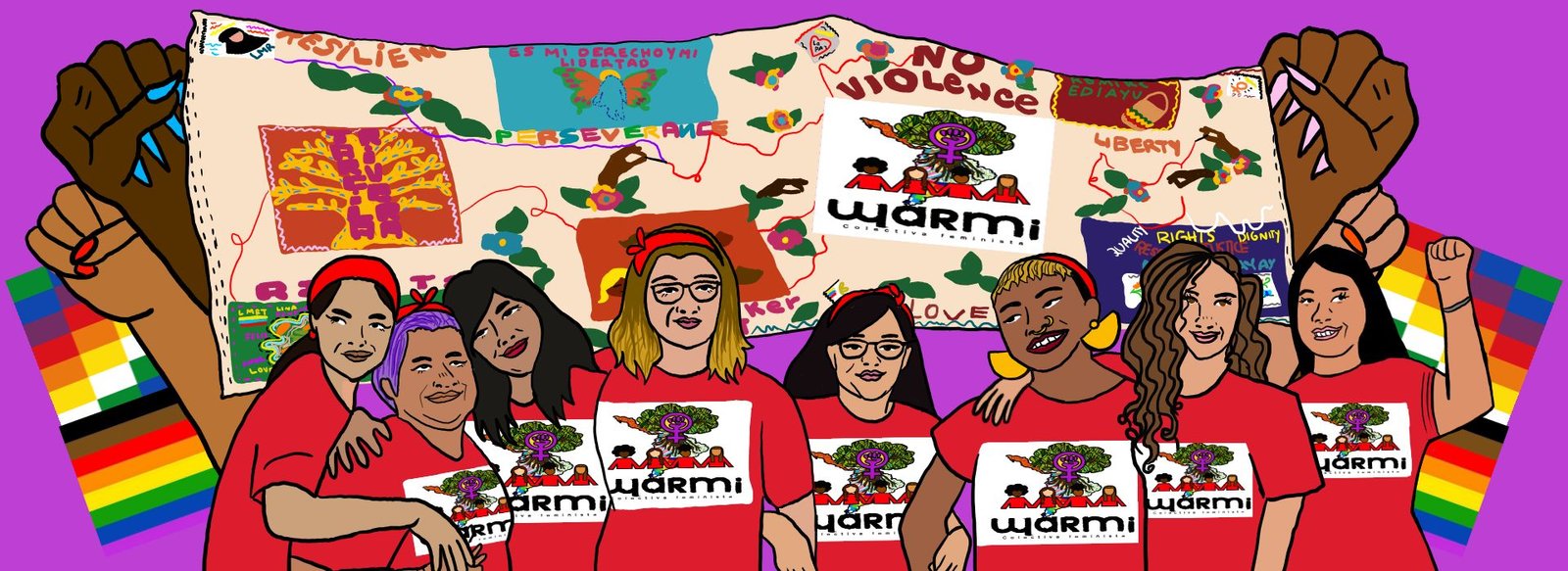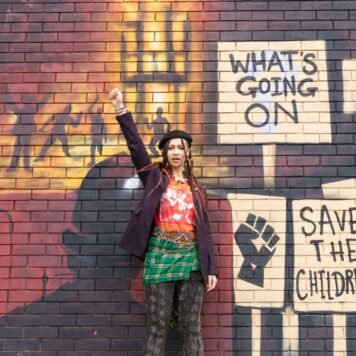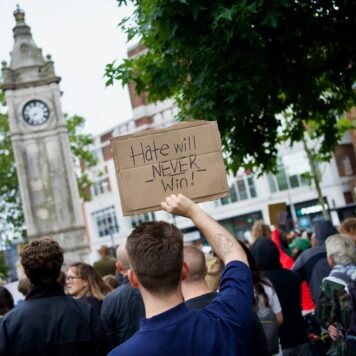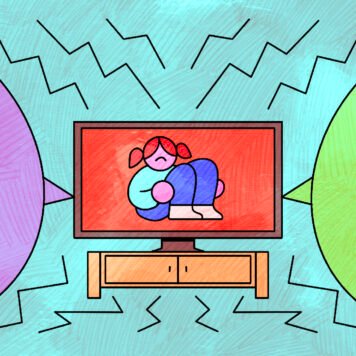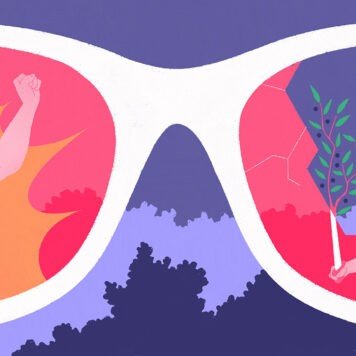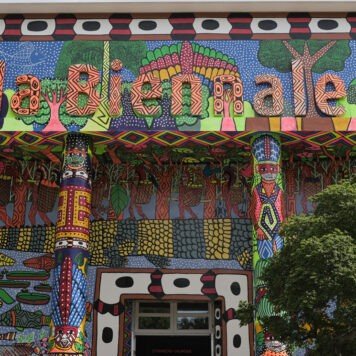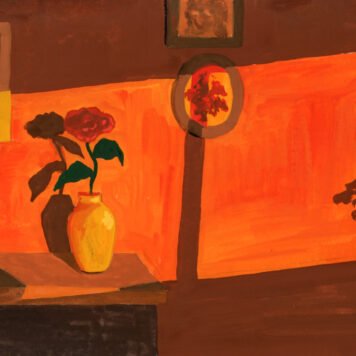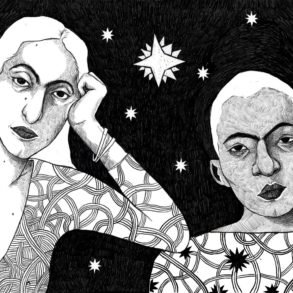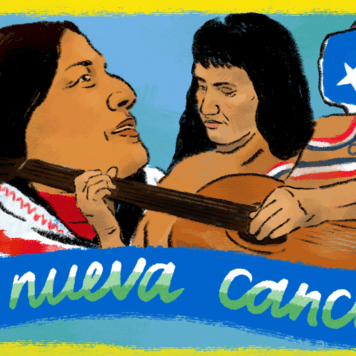“The COVID-19 crisis has been decades in the making. Centuries of state failure has left us destitute and unprotected.
The COVID-19 crisis has proven to be much more than a global pandemic. It is a confirmation of structural inequalities that many of us already knew.
We are WARMI, a grassroots feminist collective of the Latin American Women’s Rights Service (LAWRS). We are a group of activists and organisers, who have been working since 2018 on the intersecting issues of violence against women and girls and labour exploitation in the cleaning, domestic work, and hospitality sectors. We are survivors; we are leaders and healers in our community. One of our main objectives is to speak about the struggles of our community, to archive our community’s existence and history, and stand in solidarity with other groups that have been marginalised by the state as we have. We believe it is vital that we share our collective experiences as Latin American migrant women cleaners, domestic workers and activists living in the time of COVID-19 in the UK.
The moment the outbreak started, we knew we would be hit the hardest. We knew that racialised migrant communities would suffer not because there is a genetic predisposition – as implied by the UK Government – but rather because we know who are the now called ‘essential workers’ before called ‘low skilled’ workers in our society, we know who lives in overcrowded social housing, who can and can’t access healthcare. We know this very well as this is our community. Even though Latin Americans are a significant part of London’s population, representing the eighth largest non-UK born population in the capital, our community remains largely invisible. This invisibility, paired with the UK’s hostile environment policies, have limited our community’s access to basic social and economic rights.
Below, we have included our group members’ testimonies; archiving our experiences during the pandemic, highlighting key intersecting issues in our community and centering the experiences of cleaners, domestic and hospitality workers .
“The world doesn’t work without the labour and contribution of the working class.”
– Cleaner, aged 45
How has COVID-19 affected your life?
“The virus has completely changed my life, emotionally, economically, mentally. Before the virus my family and I were living paycheck to paycheck, due to our insecure migration status. We have applied several times to regularise our status, but our application has been denied by the Home Office every time. I had no safety net when the pandemic hit, the virus has destroyed everything. I have no recourse to public funds, and neither I nor my husband can work as no one is hiring due to the pandemic. We have five children and we honestly got to a point where we didn’t even have enough money to eat. I would be lost without my collective and my sisters; they have been a beacon of light in my life and have supported me to access food for my family during this crisis.”
– Office cleaner previously working in the City, aged 38
“This virus has affected us in multiple ways. It has affected our work, it has affected our emotional and mental wellbeing. It has traumatised us: we live in fear as many people like us, that look like us, are dying. We are scared that we will be next, or our families.”
– Carer, organiser and community activist, aged 68
“It has drastically affected my income. I am registered as self-employed and the virus has stopped me from working. When the Government announced the self employed scheme, I thought ‘wow, they will help people like me’, but in reality the process took ages to kick in and I am now only receiving £200 a month. That is nothing in a city like London. I am very lucky that I have a partner that can financially support me, but this is not the case for everyone.”
– Artist and domestic worker, aged 37
“This pandemic has particularly hit our undocumented comrades very hard, you do not have access to public funds, can’t acccess safe working conditions, you cannot open a bank account, you cannot rent safelly. Because of your immigration status it is very hard to access help, the structure of the UK imigration system makes people believe that we have no rights but we have them.”
– Domestic worker, organiser and community activist, aged 58
We know that COVID-19 has disproportionately impacted BIPOC communities, beyond contagion rates. How has COVID-19 specifically affected the Latin American community?
Accessing healthcare
“COVID-19 has hindered my ability to access healthcare .For a year and a half I have been suffering from severe leg issues. I was scheduled to have surgery, but it was cancelled when the pandemic started. It was a battle to advocate for my health to this point, so for it all to have been for nothing is very hard to process.”
– Organiser and office cleaner working in the City, aged 48
“In our community many cant access healthcare rapidly due to language barriers and discrimination. The socio economic barriers put in place by the state make many in the community not fluent in English, which hinders our ability to access healthcare. Some are denied the right to an interpreter when going to the GP, others must pay for people to come to their appointments to translate, and many of us have to ask our children to translate highly sensitive information. Group members have also resorted to going to continental Europe for normal GP check ups, as it is so strenuous to access simple GP appointments here in the UK. In the midst of a global pandemic this is highly concerning.”
– Community activist and office cleaner working in the City, aged 53
“I work cleaning in a COVID-19 ward, and I see how hectic it all is. I cannot imagine navigating this when you do not speak English. How do you consent to things? How do you let your loved ones know what is happening to you? I have seen many people die since the pandemic started, and I cannot help but think how devastating this experience can be for our comrades.”
– Hospital cleaner, aged 45
Work
Large numbers of our community work in the cleaning, domestic work and hospitality sectors. These are characterised by irregularity and outsourcing, which allows for frequent labour right violations. A research we participated on, which analysed 326 cases of women supported by the Employment Rights Advice Service of the Latin American Women’s Rights Service, outlined that:
- 62% of women faced breaches to their contract
- 46% experienced unlawful deduction of wages
- 1 in 5 were paid under the National Minimum Wage
- 41% of women have experienced discrimination, harassment or unreasonable treatment at work
What this data shows is that these sectors already had deep rooted, unresolved issues that affect our quality of life. Despite our community being employed, many of us live in work poverty due to poor wages, minimal or irregular working hours, alongside other inconsistencies. The COVID-19 crisis has allowed for these issues to be exacerbated, and has given employers power to continue this irregular behaviour with impunity.
“A lot of us are being sacked, despite our employers having the option to furlough us. Many in our community do not know their rights or simply can’t access them because of the language barrier. This means that the pandemic has absolutely affected us all differently and it is not as simple as accessing furlough.”
– Office cleaner working in the City, aged 45
Subscribe to shado's weekly newsletter
Exclusive event news, job and creative opportunities, first access to tickets and – just in case you missed them – our picks of the week, from inside shado and out.

“When they created the furlough scheme, they didn’t have us in mind. They didn’t think about us as essential workers. It isn’t straightforward to access either; we can’t just access the scheme if we are workers, it is down to individual employers that choose to furlough us or not. On top of that, in the cleaning sector we have irregular working hours; we are hired by a company to do several jobs. We do hours in the morning and hours in the evening in different locations. When the Government said they would pay 80% of our salaries, this is being applied to the convenience of employers. Cleaning companies will only pay one job at 80%. Which means some of us are only earning 80% of 2 hours of work a day. How do we live off that? We all have to pay rent and raise our kids.”
– Office cleaner working in the City, aged 42
“Everything is interconnected, and nothing exists in a vacuum. When the Government launched the furlough scheme, it drew a line in the sand and those of us that weren’t included were left to fend for ourselves. Be it getting sacked, having to continue working and expose ourselves to the virus, having to go off and find another job in the middle of a pandemic, the consequences were very harmful and immediate. The furlough scheme is not just about paying 80% of our wages, but it is also about gender based violence, it is also about resorting to desperate measures to make ends meet, it’s about mental health breakdowns, it is about our humanity.”
– Trade union organiser and office cleaner working in the City, aged 55
Housing
“Due to many circumstances, people in our community live in complex private accommodation arrangements. We rent irregularly, with entire families living a single room inside a house with other tenants. We have sisters who have to share their room with strangers, having to rent their room in the morning and then share with someone else who uses the room at night because despite working every single day as cleaners, they still cannot afford a room. This COVID-19 pandemic has made people live in even more precarious situations, with landlords threatening to evict us. We have to share our space 24/7 with people we could avoid in the past. We have comrades who rent baths as beds in some flats. We are overcrowded, but can’t really do anything about it because of the virus.”
– Organiser and community activist, aged 75
Accessing information
“Lack of information can be life threatening. Many of our community members have no access to trustworthy information regarding the pandemic. If you are not part of a collective like ours, it is hard to access crucial information in your language. Imagine you live here alone, all you do is work to be able to sustain living in this country, you do not speak English and you can’t find classes that fit your schedule because you can only get irregular working hours. You live isolated and now the pandemic hits, now you can’t leave your house. You cannot meet people, so you have literally no contact with others. How do you find out about stuff? How do you get updates? If you get COVID-19, what do you do?”
– Carer, organiser and community activist, aged 68
“It is not a coincidence that migrant communities are showing more COVID-19 cases. When you literally do not speak to us, how are we then to know what is happening? English speakers dont even know what is happening, how are we to know then?”
– Trade union organiser and office cleaner working in the City, aged 55
“Language shouldnt determine our accessibility to rights, when I am asked if me not knowing English is a barrier. I say not always – we can still achieve many things, we have power. I need people to know that they have rights.”
– Hospital cleaner, aged 45
What measures should be taken to mitigate the impact of COVID-19? At Government level, entities and the community itself?
“There are so many issues… the list is truly endless. We are only highlighting a few of them. But what about our sisters in detention centres? What about the sisters that are getting deported? And the ones having to quarantine with their abusers? Or our elders who are isolated and have been completely victimised during this crisis?”
– Advocate, organiser and office cleaner working in the City, aged 55
“During this pandemic, we find ourselves once again invisibilised. We see that we are spoken of as an abstract concept, but we are a community. The Government must start by honouring the fact that we are here. Recognise our community and support it.”
– Organiser and community activist, aged 75
“The Government needs to look at the facts and how their measures have affected real people and their lives.We are talking about human lives, not numbers. They need to listen to us. A lot of the policies look very comprehensive on paper but apply differently on the ground.”
– Domestic worker, organiser and community activist, aged 58
“The Government speaks of ‘integration’, but honestly they do not support us to do that. How is it possible that I cannot access my rights because I do not speak English? Aren’t I human? They simply do not invest in our communities, they cut resources to vital organisations and they cannot do the work. Then organisations have to fight for little to no resources, and whilst all that happens, many of us fall through the cracks”
– Office cleaner working in the City, aged 42
“This is all a chain of events and consequences, which started with the Government. What is happening now is that the Government is running around to cover up holes of an already sinking ship. With no real commitment to fixing the root causes of what has led us to this moment. What we see now is the continuation of cycles of exploitation, of people taking advantage of one another for the accumulation of capital.”
– Organiser, advocate and office cleaner working in the City, aged 53
“My community has been vital during these times; they supported me when my family and I were in crisis. My husband had huge cuts to his hours and I cannot work due to my disability. My community opened doors for me and assisted me, they were able to support me with getting groceries and food . My neighbours supported me with letters, they told me I could speak to them whenever I needed help. I give help to my community in whichever capacity I can, and they do the same for me. Community is crucial for us to overcome this. ”
– Activist, organiser and domestic worker, aged 46
As a collective we believe it is crucial that we all stand together as migrants, refugess, racialised, undocumented, survivor communities to achieve meaningful and long-lasting change. If we do not organise, we cannot make cohesive demands. Groups, organisations and actors need to organise. We must speak up: not just for ourselves, but for all of us.
